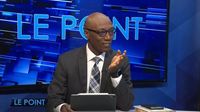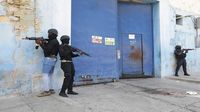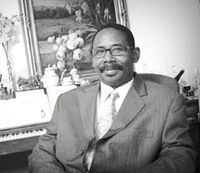In Haiti, a nation besieged by violence and despair, the echoes of a bloody and defiled Holy Week resonate deeply within the collective consciousness. Once a time of solemn processions and spiritual reflection, this year's Holy Week has been marred by horrific acts of violence that highlight the country's dire situation. The recent events have drawn stark attention to the escalating crisis, as armed gangs operate with impunity, leaving the population in a state of fear and hopelessness.
Dr. Dieudonné Jean Baptiste, a specialist in functional medicine, has voiced grave concerns regarding the ongoing violence in Haiti, which he describes as a genocide perpetrated by arms traffickers and gang leaders. He warns that the consequences of these atrocities will be irreversible, affecting multiple generations. "Numerous deaths will occur in the short, medium, and long term," he stated, emphasizing the rise in stroke cases as a direct result of chronic stress that plagues the population.
According to Dr. Baptiste, Haitians are not facing isolated incidents of stress; rather, they are exposed to prolonged and constant stress, leading to metabolic diseases such as hypertension and diabetes. He explains that fear and stress can cause brain damage, potentially triggering new health issues. Children who witness violence are particularly vulnerable, as they may develop pathologies that can be passed down to future generations through epigenetic traits. "The effects of oxidative stress are comparable to those of alcohol and tobacco consumption," he cautions.
As the violence escalates, the situation has drawn international attention. A recent United Nations report, presented during the 58th session of the Human Rights Council, paints a grim picture of Haiti's deteriorating security. UN Human Rights Chief Volker Türk noted that human rights violations have reached an unprecedented scale, with over 4,200 people killed and 1,300 injured in just eight months. The report reveals that more than one million Haitians have been displaced from their homes, with hospitals shuttered and public servants fleeing the country.
In a stark warning issued on April 11, 2025, Divisional Commissioner Daniel Compère reported that 33 heavily armed individuals are preparing coordinated attacks targeting the southern city of Les Cayes. These individuals are based between Tiburon and Les Anglais and plan to storm police stations in the coastal zone. The dire situation has led the Departmental Director to request urgent assistance due to a shortage of ammunition and weapons.
The violence has not only affected those within Haiti but has also extended to the Haitian diaspora, with many feeling the weight of the ongoing crisis. Dr. Baptiste highlighted that even those living abroad are more inclined to anticipate a bleak future than their counterparts still residing in Haiti.
As the nation grapples with the consequences of violence, the call for action has become increasingly urgent. Dr. Baptiste recommends several measures to mitigate the effects of stress, including limiting vegetable oil consumption and avoiding exposure to harmful frequencies from smartphones. He also advocates for innovative health solutions, such as hydrogen molecule tablets and hyperbaric oxygenation, which are available at PHI Haiti, as potential means to heal internal injuries.
Meanwhile, Pierre Robert Auguste, a prominent voice in the Haitian community, has expressed profound sadness over the country's plight, describing Haiti as orphaned of presidential leadership and patriotic spirit. He lamented the lack of commemoration for Toussaint Louverture, a key figure in Haiti's history, during a week that should have been marked by remembrance and reflection. Auguste criticized current leaders as corrupt and irresponsible, stating that Haiti is at the mercy of French President Emmanuel Macron's compassion.
Auguste emphasized the need for strong Haitian diplomats to negotiate with France, as the historical issue of Haiti's debt of Independence resurfaces. He argues that Haiti requires security forces, a reorganized military, and special forces to restore order. He also proposed the development of a robust road network and port infrastructure in partnership with French businesses to aid in the country's recovery.
The situation in Haiti has reached a critical juncture, with the government described as amorphic and silent in the face of escalating violence. As bandits impose their law and the population suffers, the call for a reawakening grows louder. Wandy Charles, a local journalist, captures this sentiment, declaring that the nation is on the brink of collapse, with nothing seeming sacred anymore, not even life itself. "When criminals dictate the liturgy and authorities abdicate their responsibilities, the nation becomes a fiction, a corpse on probation," he warns.
The urgency of the situation cannot be overstated. The UN's call for member states to enforce an arms embargo, bolster port and border controls, and dismantle trafficking routes is crucial in addressing the escalating violence. As the international community looks on, the people of Haiti continue to endure unimaginable hardships, their cries for help echoing through the streets.
As the Holy Week of 2025 fades into memory, it serves as a stark reminder of the challenges facing Haiti. The need for solidarity, action, and a renewed sense of purpose is more pressing than ever. Without intervention, the cycle of violence and despair may continue to spiral out of control, leaving a once vibrant nation in a state of perpetual crisis.






